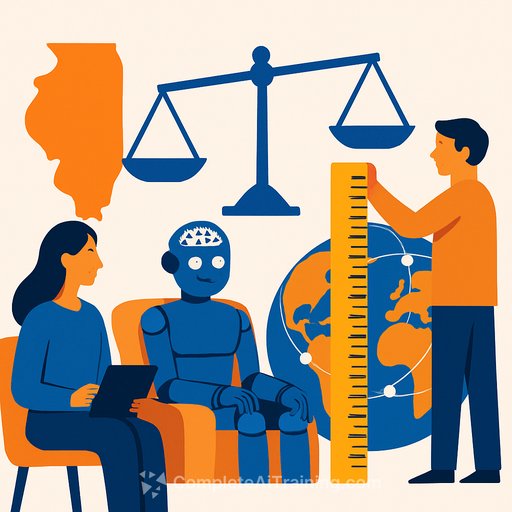Evaluating Illinois HB 1806: The Wellness and Oversight for Psychological Resources Act Through the Lens of AI Life Cycle Core Principles
Illinois enacted HB 1806 to regulate therapy and psychotherapy services, emphasizing professional oversight and consumer protection. But how well does this law align with established AI governance principles? Using a detailed AI Life Cycle Core Principles (AILCCP) framework, this article breaks down the Act’s strengths and gaps in addressing AI-related concerns in mental health care.
What Are the AI Life Cycle Core Principles?
Terms like trustworthy, safe, reliable, and secure AI are common but often lack precise definitions in legal contexts. These principles are the foundation for AI policies, regulations, and standards worldwide, influencing research, funding, and system design.
The AILCCP project collects and organizes core AI principles from leading organizations such as the OECD, ISO, IEEE, and NIST. It has cataloged 37 principles across 10 AI life cycle phases, enriched with metadata, keywords, and links to global standards and regulatory guidance. This structured approach helps translate broad AI concepts into actionable, measurable criteria for legal and regulatory analysis.
The AILCCP Database as an Analytical Tool
The AILCCP database enables context-aware AI models to assess legislation and policies by comparing text against curated principles. Tested across multiple AI platforms, this method generates quantitative scores, identifies compliance gaps, and suggests targeted improvements.
This approach is useful not only for analyzing laws but also for regulatory reviews, contract risk assessments, AI policy audits, and due diligence in mergers and acquisitions involving AI technologies.
Key Sections of the Illinois HB 1806
- Section 1 (Short Title): Names the Act as the Wellness and Oversight for Psychological Resources Act.
- Section 5 (Purpose): Protects individuals seeking therapy by requiring services from qualified, licensed professionals.
- Section 10 (Definitions): Clarifies terms such as "administrative or supplementary support" in therapy contexts.
- Section 15 (Prohibition on Unauthorized Services): Bars unlicensed individuals or entities from offering therapy services.
- Section 20 (Enforcement and Penalties): Imposes civil penalties up to $10,000 per violation.
- Section 25 (Exceptions): Exempts religious counseling, peer support, and self-help materials.
- Section 99 (Effective Date): Sets the Act’s effective date upon becoming law.
Scoring Highlights of HB 1806 Against AI Principles
| Principle | Score (0-5) | Brief Rationale |
|---|---|---|
| Accountability | 5 | The Act demands licensed professionals maintain full responsibility for AI use in therapy, backed by enforceable penalties. |
| Human-Centered | 5 | Therapeutic services must be delivered by licensed humans; AI cannot independently engage with clients. |
| Safety | 4 | Strong consumer protections exist, but the Act lacks explicit safety testing requirements for AI tools. |
| Security | 4 | Licensing restricts unqualified AI use, though specific technical security measures are absent. |
| Trustworthy | 3 | Trust is built through professional requirements, but transparency and explainability provisions are missing. |
| Governance | 3 | Department oversight is defined but would benefit from a more comprehensive AI governance framework. |
| Reliability | 2 | Implicit through professional oversight; lacks explicit reliability testing and monitoring mandates. |
Identified Gaps and Recommendations for Future Legislation
- Transparency: Require written disclosures explaining AI’s role, capabilities, and limitations in therapy.
- Consent: Mandate informed patient consent for AI usage, including recordings and data processing, with opt-out options.
- Privacy: Introduce strict data protection standards, including privacy impact assessments for AI tools handling sensitive mental health data.
- Fairness and Bias: Enforce bias testing, audits, and corrective measures to ensure equitable AI-assisted therapy across demographics.
- Explainability: Demand AI systems provide interpretable outputs for professionals to communicate to patients.
- Data Stewardship: Define clear policies on data ownership, access controls, and audit trails for AI systems.
- Accessibility and Equity: Ensure AI platforms meet accessibility standards and do not exacerbate healthcare disparities.
- Ethics and Fundamental Rights: Embed ethical principles and protect patients’ rights to human therapy and recourse for AI-related harms.
- Accuracy and Metrics: Set accuracy standards with regular performance reporting and error disclosures.
- Robustness: Require stress and failure mode testing to maintain AI system reliability under various conditions.
Summary
Illinois HB 1806 establishes a strong foundation for professional accountability, human-centered care, and safety in AI-assisted therapy services. It effectively restricts unauthorized AI use and sets enforcement mechanisms. However, it falls short in areas like transparency, patient consent, privacy protections, and algorithmic fairness.
Addressing these gaps will strengthen the law’s alignment with international AI standards and better safeguard patients in the evolving landscape of AI-enhanced mental health care.
Scoring Methodology Overview
The analysis uses a weighted scoring system considering:
- Keyword Evidence (10%): Frequency of principle-related keywords.
- Definition Alignment (20%): Semantic match between legal provisions and principle definitions.
- Obligations (40%): Enforceable duties expressed in the law.
- Enforcement Strength (30%): Presence and robustness of penalties and enforcement mechanisms.
Scores range from 0 to 5, with specific guardrails forcing zero scores if critical requirements—like transparency or consent—are entirely missing.
This structured framework transforms subjective legal interpretations into measurable, actionable insights.
For legal professionals interested in AI governance, this approach offers a practical method to evaluate compliance and guide legislative improvements. To explore more on AI principles and legal frameworks, resources like the ISO AI Standards Committee and NIST AI Program provide authoritative guidance.
Your membership also unlocks:






